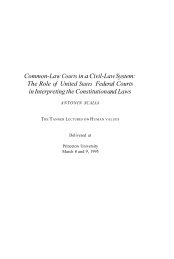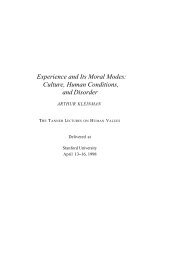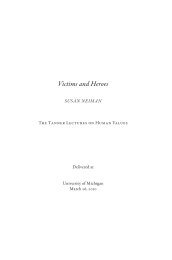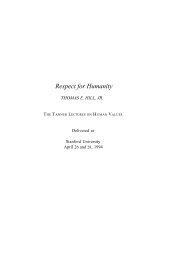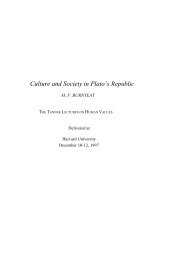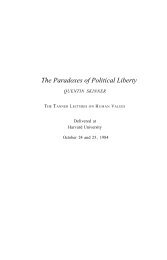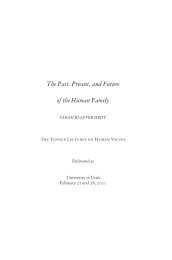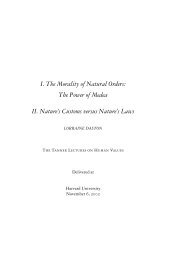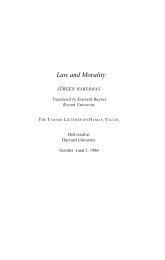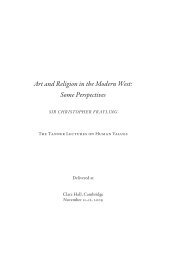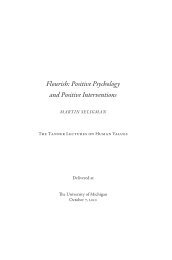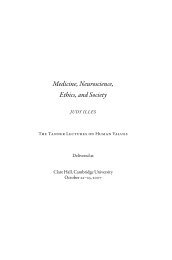Muguerza, Javier - The Tanner Lectures on Human Values
Muguerza, Javier - The Tanner Lectures on Human Values
Muguerza, Javier - The Tanner Lectures on Human Values
Create successful ePaper yourself
Turn your PDF publications into a flip-book with our unique Google optimized e-Paper software.
96 <str<strong>on</strong>g>The</str<strong>on</strong>g> <str<strong>on</strong>g>Tanner</str<strong>on</strong>g> <str<strong>on</strong>g>Lectures</str<strong>on</strong>g> <strong>on</strong> <strong>Human</strong> <strong>Values</strong>of human rights to be approved, but <strong>on</strong> c<strong>on</strong>diti<strong>on</strong> they not beasked Why? that is, For what “reas<strong>on</strong>”?).In which case, Bobbio’s trust might well be betrayed, and hewould risk the charge - a charge that c<strong>on</strong>temporary ethics of discourse,or “communicative ethics,” levels at any c<strong>on</strong>venti<strong>on</strong>alistpositi<strong>on</strong> more or less inspired in the traditi<strong>on</strong> of the social c<strong>on</strong>tract- that no factual collective agreement, not even a true c<strong>on</strong>sensusomnium gentium, can c<strong>on</strong>tain its own rati<strong>on</strong>al grounding,since the factuality of such agreements would never by itself be aguarantee of their rati<strong>on</strong>ality. As is well known, the cultivatorsof this communicative ethics tend to believe that a factual c<strong>on</strong>sensusof this sort can be c<strong>on</strong>sidered “rati<strong>on</strong>al” <strong>on</strong>ly to the extentthat the means of obtaining it approximate those that the membersof an ideal assembly-presumably less subject to spuriousc<strong>on</strong>siderati<strong>on</strong>s than the United Nati<strong>on</strong>s General Assembly -would have to follow to obtain, in uninhibited communicati<strong>on</strong>and by no other means than “discourse” or cooperative discussi<strong>on</strong>,a similarly ideal and even counterfuctual c<strong>on</strong>sensus, <strong>on</strong>e whoserati<strong>on</strong>ality would be above suspici<strong>on</strong>. For - as is also wellknown - discourse or communicative ethics is extremely sensitiveto the “theory of rati<strong>on</strong>ality,” and with good reas<strong>on</strong>, since itattempts to offer itself as a theory of practical reas<strong>on</strong>, which iswhat ethics amounts to for many of us.If we wish to put it this way, the “theory of c<strong>on</strong>sensus” thatthis sort of ethics of discourse or communicative ethics defends,tries in some sense to go “bey<strong>on</strong>d the social c<strong>on</strong>tract,” 41 as theseextracts from the chef d’oeuvre of <strong>on</strong>e of its representatives show:<str<strong>on</strong>g>The</str<strong>on</strong>g> free acceptance undertaken by human beings <strong>on</strong>ly c<strong>on</strong>stitutesa necessary, but not a sufficient, c<strong>on</strong>diti<strong>on</strong> of the moralvalidity of norms, Immoral norms can also be accepted by menas obligatory, out of error or <strong>on</strong> the assumpti<strong>on</strong> that <strong>on</strong>ly41 I refer the reader to my paper “Más allá del c<strong>on</strong>trato social (Venturas ydesventuras de la ética comunicativa),” chap. 7 of Desde la perplejidad (Madrid,in press).



